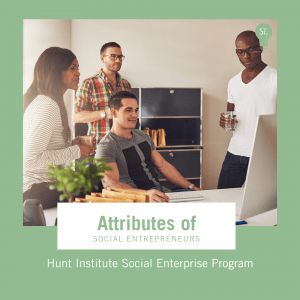What does it take to become a social entrepreneur? Previous blog posts in the Hunt Institute Digest have outlined that a social entrepreneur is someone who seeks to drive positive social or environmental change in their community.
Across a myriad of reputable sources, it is commonly agreed upon that social entrepreneurs identify a problem in society that they are passionate about, develop a creative solution to address that problem, and establish an organization that persistently pursues that mission. There are many other aspects to social entrepreneurs but we will focus on these three in this post.
PASSION: Social entrepreneurs are invested in their organization’s mission. They are determined to see their dream become reality and will take the necessary risks to achieve their goals. Social entrepreneurs care deeply about improving their community.
A Forbes article titled “5 Social Entrepreneurs On How To Turn Your Passion Into A Successful Impact-Driven Business” by MeiMei Fox gives an example of a passionate entrepreneur, founder & CEO of SunPoynt Energy, Kennedy Lamwenya. Growing up in rural Kenya, Lamwenya and those in his community did not have access to reliable electricity. His parents struggled to afford the kerosene the family relied on for light and it often ran out of fuel before Kennedy completed his schoolwork. These challenges inspired Lamwenya to found SunPoynt Energy which brings solar-powered TVs to rural areas in Kenya. The TV systems give Kenyans access to light, cell phone charging ports, news, educational programs, and entertainment.
CREATIVITY: Social entrepreneurs approach problems differently than most. Instead of accepting the way something is, they challenge and question why it can’t be better. They have an ability to look at issues from multiple angles and develop innovative solutions.
A Cause Artist article titled “The 35 Social Entrepreneurs To Watch For In 2019” by Grant Trahant examines Clarence Tan, a creative social entrepreneur and founder & CEO of Boddle Learning, an edtech company. His platform allows elementary school students to learn and practice math skills in an engaging game-based format. Boddle uses a unique, adaptive learning algorithm so that each student receives differentiated questions specific to their learning needs.
PERSISTENCE: Social entrepreneurs face many challenges, especially in the early stages of building their social enterprise. They must persist through these obstacles by learning from mistakes, adapting to make improvements, and connecting with others who can support their mission.
Robin D. Schatz in her Forbes article titled “How A Social Entrepreneur Overcame His ‘Arrogant Failure’ And Won Kudos From Oprah”, describes how Gavin Armstrong demonstrates persistence. Armstrong is the founder and CEO of Lucky Iron Fish whose organization’s mission is to eliminate iron deficiency, which affects almost 3.5 billion people globally. The solution is a fish-shaped cooking tool. Dropping the product into your cooking water for 10 minutes provides 75% of the daily requirement of iron. When the company opened for business in Cambodia, they expected their affordable product to sell well. However, they only sold about one fish per month. Instead of giving up on the idea, what Armstrong realized is that the organization needed to build trust in the community before they can expect citizens to purchase their product. By partnering with established NGOs in the community, Lucky Iron Fish built its credibility and has now helped over 10,000 families in Cambodia with iron deficiencies.
Early-stage social entrepreneurs are catalytic innovators who produce disruptive innovations, but often face momentous obstacles. The Hunt Institute‘s Social Enterprise program is designed to support high potential social entrepreneurs during the initial phases of development. Do you have what it takes to become a successful social entrepreneur?
To read more about the Hunt Institute’s work to develop future-focused solutions to some of the world’s biggest problems, please click here. For the latest news on the Hunt Institute, follow our social media accounts on LinkedIn, Facebook, Twitter, and Instagram. We invite you to listen to our Podcast called Sages & Seekers. If you are considering engaging with the institute, you can donate, or sign-up for our newsletter by emailing huntinstitute@smu.edu.


